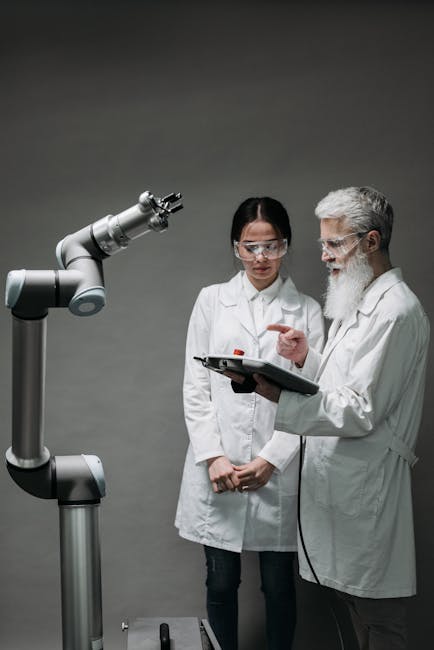Penn’s “Betty” Supercomputer Enters the 2025 AI Computing Fray
University of Pennsylvania’s new off-campus supercomputer, dubbed “Betty,” has officially commenced operations, marking a significant addition to the burgeoning field of artificial intelligence (AI) computing in 2025. The system’s deployment represents a substantial investment in high-performance computing infrastructure, placing Penn among the leading academic institutions actively participating in the ongoing AI arms race. This development underscores the escalating demand for advanced computational resources fueled by the rapid growth and increasing sophistication of AI algorithms.
Betty’s Technical Specifications and Capabilities
Betty boasts impressive processing power, exceeding previous generation systems by a considerable margin. Early benchmark tests indicate a significant improvement in computational speed and efficiency, vital for training complex AI models. Specific technical details regarding processing units, memory capacity, and interconnect technology remain partially undisclosed due to ongoing competitive pressures. However, independent analysts suggest its performance ranks among the top 20 university-based supercomputers globally as of late 2025. This level of performance allows for accelerated research and development across a variety of AI-related disciplines.
Impact on Research
The arrival of Betty is expected to catalyze groundbreaking research at Penn across various fields. Researchers anticipate significant advancements in areas such as natural language processing, computer vision, and drug discovery. The enhanced computational capabilities will enable the exploration of larger datasets and more intricate algorithms than previously possible. This, in turn, will lead to more accurate models and potentially transformational breakthroughs. The university anticipates an increase in research publications and patent applications directly attributed to Betty’s capabilities.
The Broader Context: The 2025 AI Computing Landscape
The launch of Betty coincides with a period of intense competition in the global AI supercomputing market. 2025 has seen a surge in investment from both private sector companies and governmental entities, driving a rapid pace of innovation and deployment of increasingly powerful systems. This escalating competition is driven by the strategic importance of AI in numerous sectors, from healthcare and finance to defense and manufacturing. The race to secure advanced computational resources reflects a fundamental shift in global technological power dynamics.
Geopolitical Implications
The deployment of high-performance computing systems like Betty also carries significant geopolitical implications. The concentration of advanced AI computing capabilities in specific regions or institutions can influence the balance of power in various sectors. Access to these resources is becoming increasingly crucial for national competitiveness and technological leadership in the 21st century. This reality is prompting governments worldwide to invest heavily in their own national supercomputing infrastructure to ensure technological autonomy and security.
Economic and Societal Impacts of Increased AI Computing Power
The proliferation of advanced AI computing capabilities has far-reaching economic and societal implications. While promising significant advancements in various sectors, it also raises concerns regarding job displacement and potential biases embedded in AI algorithms. The rapid advancement of AI technology demands a concurrent focus on ethical considerations, regulations, and workforce development to mitigate potential negative impacts. Governments and academic institutions need to work collaboratively to address these challenges proactively.
Addressing Ethical Concerns
The increased computing power available with systems like Betty necessitates a focused effort to address ethical concerns associated with AI development and deployment. This includes careful consideration of issues such as algorithmic bias, data privacy, and the responsible use of AI in sensitive areas like healthcare and law enforcement. Developing robust ethical guidelines and regulatory frameworks is crucial to ensure that AI technologies are utilized in a way that benefits society as a whole, rather than exacerbating existing inequalities.
Future Projections and Challenges
Looking ahead, the continued growth of AI computing will depend on several key factors, including the development of more energy-efficient hardware, the advancement of software algorithms, and the availability of skilled personnel. Overcoming these challenges is crucial for sustaining the momentum in AI research and development. The long-term success of initiatives like the deployment of Betty hinges on these crucial elements. Moreover, effective collaboration between academia, industry, and government will be essential for maximizing the benefits of advanced AI computing.
Key Takeaways from 2025:
- The global AI supercomputing market remains highly competitive in 2025.
- Government investment is a key driver of growth in this sector.
- Ethical considerations surrounding AI development are increasingly prominent.
- Energy efficiency remains a significant challenge for future advancements.
- The skills gap in AI-related fields presents a potential bottleneck.
Conclusion: Betty and the Future of AI
The launch of Betty signifies a significant step forward in the ongoing AI arms race. While offering immense potential for scientific breakthroughs and technological advancement, it also underscores the urgency of addressing ethical concerns and ensuring responsible development and deployment of this powerful technology. The future impact of systems like Betty will depend on a collaborative approach, involving researchers, policymakers, and the broader community, to navigate the complex challenges and opportunities presented by the rapidly evolving field of artificial intelligence. The year 2025 marks a pivotal moment in this ongoing evolution, and systems like Betty are at the forefront of this transformative era.

